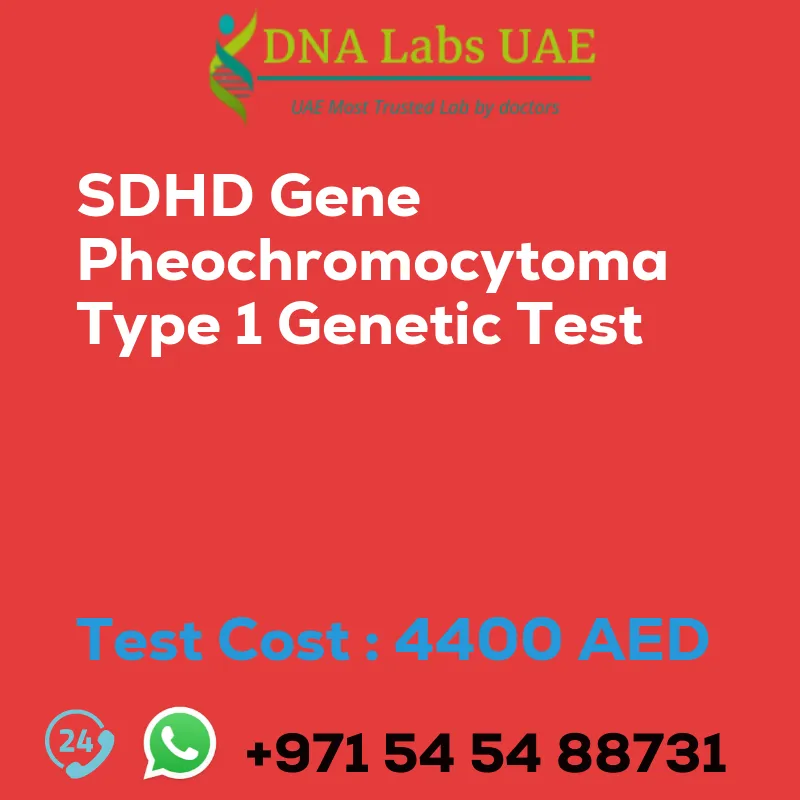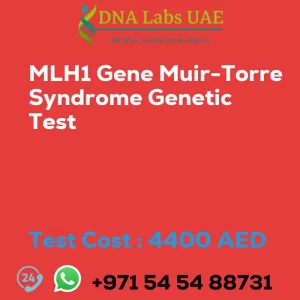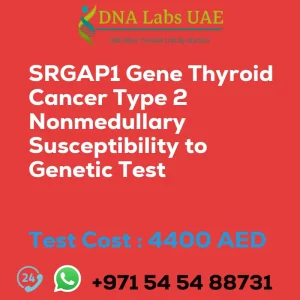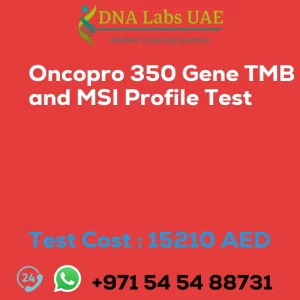SDHD Gene Pheochromocytoma Type 1 Genetic Test
Welcome to DNA Labs UAE, your trusted genetic testing provider. Today, we will be discussing the SDHD Gene Pheochromocytoma Type 1 Genetic Test, its components, cost, symptoms, diagnosis, and more.
Test Name: SDHD Gene Pheochromocytoma Type 1 Genetic Test
- Components: Blood or Extracted DNA or One drop Blood on FTA Card
- Price: 4400.0 AED
- Sample Condition: Blood or Extracted DNA or One drop Blood on FTA Card
- Report Delivery: 3 to 4 Weeks
- Method: NGS Technology
- Test Type: Cancer
- Doctor: Oncologist
- Test Department: Genetics
Pre Test Information
Before undergoing the SDHD Gene Pheochromocytoma Type 1 NGS Genetic DNA Test, it is important to provide the clinical history of the patient. Additionally, a genetic counseling session will be conducted to draw a pedigree chart of family members affected by the SDHD Gene Pheochromocytoma Type 1 NGS Genetic DNA Test gene SDHD.
Test Details
The SDHD gene is responsible for producing a protein called succinate dehydrogenase complex subunit D, which plays a critical role in the mitochondria – the energy-producing centers of cells. Pheochromocytoma type 1 is a rare genetic condition characterized by the development of tumors called pheochromocytomas, which typically arise from the adrenal glands located on top of the kidneys. These tumors produce excess amounts of hormones, such as adrenaline and noradrenaline, leading to symptoms like high blood pressure, rapid heart rate, and anxiety.
Next-Generation Sequencing (NGS) is a technology used in genetic testing to analyze multiple genes simultaneously, quickly and accurately. Compared to traditional sequencing methods, NGS allows for the sequencing of large amounts of DNA in a shorter amount of time. The SDHD Gene NGS Genetic Test involves sequencing the SDHD gene to identify any variations or mutations associated with the development of pheochromocytoma type 1. This test aids in the diagnosis of individuals with the condition and can be utilized for genetic counseling and family planning purposes.
At DNA Labs UAE, we strive to provide reliable and comprehensive genetic testing services. If you suspect pheochromocytoma type 1 or have a family history of the condition, consider our SDHD Gene Pheochromocytoma Type 1 Genetic Test. Contact our Genetics Department to schedule an appointment with our experienced Oncologist.
| Test Name | SDHD Gene Pheochromocytoma type 1 Genetic Test |
|---|---|
| Components | |
| Price | 4400.0 AED |
| Sample Condition | Blood or Extracted DNA or One drop Blood on FTA Card |
| Report Delivery | 3 to 4 Weeks |
| Method | NGS Technology |
| Test type | Cancer |
| Doctor | Oncologist |
| Test Department: | Genetics |
| Pre Test Information | Clinical History of Patient who is going for SDHD Gene Pheochromocytoma type 1 NGS Genetic DNA Test. A Genetic Counselling session to draw a pedigree chart of family members affected with SDHD Gene Pheochromocytoma type 1 NGS Genetic DNA Test gene SDHD |
| Test Details |
The SDHD gene is a gene that provides instructions for making a protein called succinate dehydrogenase complex subunit D. This protein is part of a larger protein complex that plays a critical role in the mitochondria, the energy-producing centers of cells. Pheochromocytoma type 1 is a rare genetic condition characterized by the development of tumors called pheochromocytomas. These tumors typically arise from the adrenal glands, which are located on top of the kidneys. Pheochromocytomas produce excess amounts of certain hormones, such as adrenaline and noradrenaline, which can lead to symptoms such as high blood pressure, rapid heart rate, and anxiety. NGS (Next-Generation Sequencing) is a technology used in genetic testing to rapidly and accurately analyze multiple genes simultaneously. It allows for the sequencing of large amounts of DNA in a shorter amount of time compared to traditional sequencing methods. An SDHD gene NGS genetic test would involve sequencing the SDHD gene to look for any variations or mutations that may be associated with the development of pheochromocytoma type 1. This test can help diagnose individuals with the condition and may also be used for genetic counseling and family planning purposes. |








